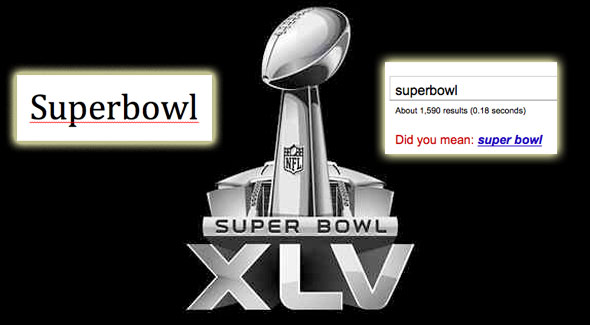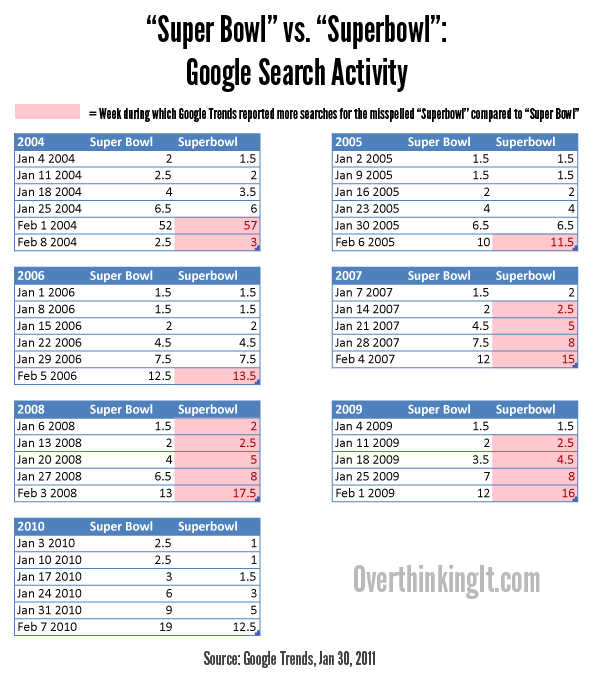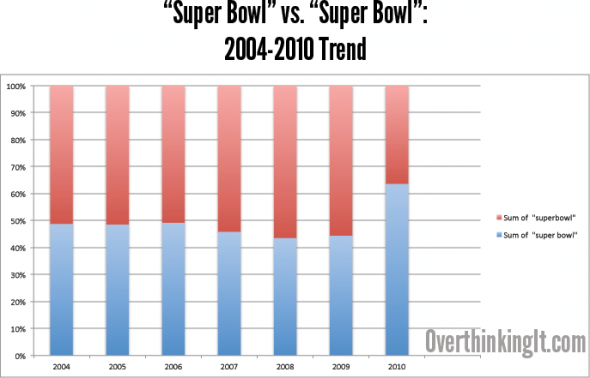
A few days after the 2009 Super Bowl, I ran an article on Overthinking It warning of an American spelling crisis in progress. Our nation couldn’t even spell the name of our most sacred beer drinking related holiday, the SUPER BOWL, correctly. At the time, my analysis of Google Trends data indicated an alarming increase in the prevalence of searches of “Superbowl” compared to “Super Bowl.” Even our own editor, master of the English language that he is, had made the mistake on this site by using “Superbowl” in the title of a post. I was saddened and ashamed.
With this year’s Superbowl Super Bowl fast approaching, I thought it appropriate to update the analysis with new data to see if we are indeed in the throes of an American Spelling Crisis.
Here’s the week-by-week breakdown for “Super Bowl” vs. “Superbowl” search volume by year, from 2004-2010:
 Ladies and gentlemen, CRISIS AVERTED. It appears that America used its collective Spell Checker and figured out that there is in fact a space between SUPER and BOWL.
Ladies and gentlemen, CRISIS AVERTED. It appears that America used its collective Spell Checker and figured out that there is in fact a space between SUPER and BOWL.
Here’s another view of the data, aggregated by year, to reinforce the point:

Of course, you can thank Overthinking It for raising awareness of the issue back in February 2009, which clearly led to the improved spelling in January-February 2010. And the early data for 2011 looks promising:

Once again, “Super Bowl” is in the lead. Suck it, “Superbowl”! Overthinking It wins a victory for insufferable pedants everywhere!
Joking and trash-talking aside, I do want to prompt a serious discussion on the proper spelling of the Super Bowl and the way we use the English language. There’s plenty of room to argue that “Superbowl” is actually a perfectly “correct” way to write the name of the football game that’s happening next week. As commenter Sariel Thrawn noted two years ago:
It seems that people are just making the assumption (and a logical one I feel) that this event is not an event (a bowl) that is “super” but rather that it is a singular event known as the “Superbowl.”
I don’t think it’s lazy. I think it makes perfect sense. Especially if you’re not a huge football fan and/or overthinker.
Sariel Thrawn has a fair point. Does our collective interpretation of the meaning of an event have the same kind of language legitimacy that authorities such as the NFL and the Microsoft Word spell checker have? I’ll let you all duke it out in the commints coments comments. Also feel free to speculate wildly as to the reason for the trend reversal in 2010 if you don’t think the causal relationship with my article is strong enough.
(And feel free to talk about the actual football game itself, if that is of more interest to you than arguing over spelling.)
My hypothesis on the cause of the trend reversal is the rise of Google Suggest, the autocomplete search function. It became default on the Google homepage in August 2008 (http://googleblog.blogspot.com/2008/08/at-loss-for-words.html), and got more functionality (such as working on results pages) throughout 2009.
Right now on Google by the time you get to “sup…”, “super bowl 2011” is the top suggestion, and even if you type “superbo…” you still get a bunch of “super bowl” variants as the top suggestions. So more people are just typing “sup” and going with the top suggestion, thereby skewing the Trends results.
I think in January of 2009, people were still getting used to the autocomplete and/or the suggestions were based more on previous search trends, which is why we don’t get the full trend reversal until January 2010, when more people had fully embraced it.
Nobody is really searching for “super bowl” or “superbowl”, they’re searching for some concept that includes “super” and/or “bowl” and allowing Google to tell them what they want. So it’s really Google enabling people to be lazier while providing the illusion of correctness.
Thanks, Mark, for pointing that out. I’ve grown so accustomed to the autocomplete that I’ve forgotten there was a time that it didn’t exist.
But I’d like to think that I can still take a small amount of credit for the trend reversal. ;-)
I had a couple linguistics classes in college where we discussed the evolution of phrases like “iced cream” and “boxed set” into “ice cream” and “box set”. That is a spoken and not just a written distinction as here, but I think fits the general trend of phrases getting shorter and snappier as they are used more frequently.
And actually, when we say “SOOperbowl” it is as one word with only one inflection on the “soo”. Not like “SOO-per (pause) BOWL”. The “bowl” just kind of tags along on the end there, sounding like all part of the same word.
Further: I wonder if we’re more likely to mush the words together when the first word is an adjective, as here, as opposed to something like the Rose Bowl, with two nouns side-by-side. “Superbowl” does not offend my vision the way “Rosebowl” does.
I always read it as “Superb Owl”, expecting some kind of falconry display at half-time. After years of disappointment I now realise my folly.
ha! Nice one!
Worst Harry Potter fanfic ever.
+1
Looks like autocomplete is saving us from ourselves. Maybe Google really is god?
“Sariel Thrawn has a fair point. Does our collective interpretation of the meaning of an event have the same kind of language legitimacy that authorities such as the NFL and the Microsoft Word spell checker have?”
No, our collective interpretation does not have the same kind of legitimacy because Super Bowl is a proper noun trademarked by the NFL. That’s what it’s called and how it’s spelled. We don’t get to re-brand Coke as Cocac Ola and we don’t get to tell other people how to spell or pronounce their names.
The phrase is both referring to a bowl that is super, and also referring to one event, but even that event is called the Super Bowl.
Just do, like, work for the NFL or something? The kleenex people want us to stop using kleenex as a genericized trademark, instead we’re supposed to say Kleenex TM Brand nasal tissues or some such s***, but do we listen? Sure, we don’t get to “re-brand” Coke as Cocac Ola–that is, we can’t order them what to say or write, but neither can they order us what to say or write. Unless, of course, you’re a drone who just *loves* obeying every whim of his corporate overlords.
Actually, we’ve renamed Coca-Cola as Coke. The cans of the regular soda, at least, all call it Coca-Cola, but I’ve rarely heard anyone refer to it that way. Heck, in the South in the USA, “coke” means any soda, so you can ask for a “coke” and get a Sprite! The diet version uses “coke” in the name, something I assume but don’t feel like proving was an adoption of the nickname by the company.
Languages change, because the world and our understanding of it changes. Sure, there’s a significant element of laziness about it. (See Coke vs Coca-cola.) Given that, it’s actually surprising that the only shortening of “Super Bowl” was to remove a space and lower-case a letter. Given its status in the world of football, it could legitimately be called “The Bowl.” (Perhaps the fact that most bowls are collegiate-level and this is one of only a couple of professional-level bowls is part of what has kept that from happening.)
I agree with others that “super” as an adjective also makes it feel less wrong to run them together, especially in a phrase like “Super Bowl Sunday.” As Jessica points out, if you say that out loud, there’s not the same space between super and bowl that there is between bowl and Sunday. Given the common occurrence of Super Bowl parties, which aren’t officially sponsored by the NFL, a casual “superbowl party” feels as right as “Super Bowl party.”
Hmm, that’s another aspect of it. Lee makes the assumption that people are spelling it Superbowl when running the words together. It’s as likely, especially when we’re talking search engines, that people are using “superbowl.” I would posit that, if that’s the case, we’re moving into the territory of kleenex and xerox and the like, where a brand name is becoming a common noun, albeit in this case with a change. (Ala coke in the South, perhaps.)
Is it wrong? I don’t think so. It’s just what people do. Does it have legitimacy? That’s a tougher question. I’d say that, to a point, yes. The whole point of language is to communicate. If the person you’re typing to understands that, when you say “superbowl” you mean “The Super Bowl,” communication has happened, you’re both on the same page, and you’ve done it slightly more efficiently.
Actually, the cans reading “Coca-Cola Classic” was a response to the New Coke disaster. this was what the Coke cans looked like before the New Coke debacle.
This is really just an example of an extremely common linguistic occurrence called word-compounding. (I forget what the name for the process of creating one is though at the moment.)
If you look at the history of the English language (and others) you’ll notice, even among individuals, that newly coined words made of two stems slowly are brought together by how commonly they were used.
Words like “blackboard” were once “black board.” Words that people are unsure about (getting more common and recognized as a single unit rather than two separate units where the first stem describes the second stem) have been recorded sequentially as, for example, “Black board, black-board, blackboard.” People tend to run words together in speech and then when spelling it refer to how we pronounce them (together. Humans have done this many many many many many times and will continue to do so. SO, personally, I am a linguistic descriptivist (while not a dictionary word–one used by some of my linguistic professors) rather than prescriptivist. I like to observe how languages will evolve rather than “prescribe” how it “should” be.
In short–I don’t care and let languages evolve (because they will anyway).
There are “correct” spellings btw and they just do happen to be spellings that are used widely.
See, this is what I was going for above. I just got lazy before I got the right examples out. Yay Tina.
Super Man approves of this post. Super Man also feels that descriptive grammar is for morally conflicted jerks like Bat Man.
Good point. Don’t forget Spider-Man.
and Wonderwoman.
This kind of shit drives me nuts as an editor, because do you know what? If enough people start misspelling something, MS Word just says it’s OK, rendering the spell checks of my authors useless. For example, ACKNOWLEDGMENTS has no “e” after the “g.” “Minuscule” was created before the word “mini” and should not be spelled “miniscule.” But just trying telling Word this. Soon Microsoft will decide Superbowl is OK by them…hey look, my browser’s spell checker didn’t even underline “Superbowl.” So there you have it.
I know I’m late to the party here, but this is still something that interests me.
This is how the English language works. If enough people start spelling something in a particular way, then it becomes correct. That’s how “to-morrow” became “tomorrow”, and how “color” became “colour” in Commonwealth countries, while staying as “color” in other countries.
This, I feel, is a strength of the English language. Without a central governing body, the language freely changes and adapts to people’s usage. If a word doesn’t exist for something, then a word can be made for it.
If a phrase such as “black board” is no longer used to describe a board which is black, but rather used as the name of an object, then “blackboard” becomes a word. The same is happening with “Super Bowl”. It’s not used as a noun with an adjective before it, but is instead used as a noun by itself; “Superbowl”.
Other languages do have governing bodies. I’m a French speaker, so I’m going to pick on French, and l’Académie Française. L’Académie decides on what is French, and what is not French. This means that, sometimes, French is left without a word for something new.
Email, for instance, was invented in the 1970s. In English, it was called email (or e-mail). Similarly, French-speaking people called it email, because that was the only word that existed for it. It wasn’t a French word, but it was what the French called it.
It wasn’t until 2003 that l’Académie decided that the French language needed a word for this electronic messaging thing. And the word they chose was “Courriel“, a word no French person used.
This approach to language – where things are not permitted to change freely, and where a common spelling can be deemed “incorrect”, while an uncommon one is “correct” – weakens the language. Instead of a vibrant, living, changing language, official French is archaic, slow to react, and increasingly irrelevant, even in France.
Even the official website of the Présidence de la République invites you to enter your “e-mail”, in order to receive the “Newsletter”.